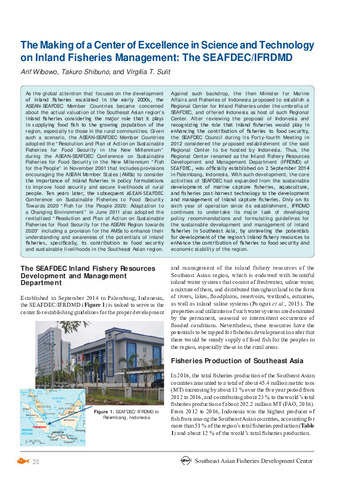The making of a center of excellence in science and technology on inland fisheries management: The SEAFDEC/IFRDMD
Share
นามธรรม
As the global attention that focuses on the development of inland fisheries escalated in the early 2000s, the ASEAN-SEAFDEC Member Countries became concerned about the actual valuation of the Southeast Asian region’s inland fisheries considering the major role that it plays in supplying food fish to the growing population of the region, especially to those in the rural communities. Given such a scenario, the ASEAN-SEAFDEC Member Countries adopted the “Resolution and Plan of Action on Sustainable Fisheries for Food Security in the New Millennium” during the ASEAN-SEAFDEC Conference on Sustainable Fisheries for Food Security in the New Millennium “Fish for the People” in November 2001 that includes provisions encouraging the ASEAN Member States (AMSs) to consider the importance of inland fisheries in policy formulations to improve food security and secure livelihoods of rural people. Ten years later, the subsequent ASEAN-SEAFDEC Conference on Sustainable Fisheries to Food Security Towards 2020 “Fish for the People 2020: Adaptation to a Changing Environment” in June 2011 also adopted the revitalized “Resolution and Plan of Action on Sustainable Fisheries for Food Security for the ASEAN Region towards 2020” including a provision for the AMSs to enhance their understanding and awareness of the potentials of inland fisheries, specifically, its contribution to food security and sustainable livelihoods in the Southeast Asian region. Against such backdrop, the then Minister for Marine Affairs and Fisheries of Indonesia proposed to establish a Regional Center for Inland Fisheries under the umbrella of SEAFDEC, and offered Indonesia as host of such Regional Center. After reviewing the proposal of Indonesia and recognizing the role that inland fisheries would play in enhancing the contribution of fisheries to food security, the SEAFDEC Council during its Forty-fourth Meeting in 2012 considered the proposed establishment of the said Regional Center to be hosted by Indonesia. Thus, the Regional Center renamed as the Inland Fishery Resources Development and Management Department (IFRDMD) of SEAFDEC, was officially established on 2 September 2014 in Palembang, Indonesia. With such development, the core activities of SEAFDEC had expanded from the sustainable development of marine capture fisheries, aquaculture, and fisheries post-harvest technology to the development and management of inland capture fisheries. Only on its sixth year of operation since its establishment, IFRDMD continues to undertake its major task of developing policy recommendations and formulating guidelines for the sustainable development and management of inland fisheries in Southeast Asia, by unraveling the potentials for development of the region’s inland fishery resources to enhance the contribution of fisheries to food security and economic stability of the region.
การอ้างอิง
Wibowo, A., Shibuno, T., & Sulit, V. T. (2018). The making of a center of excellence in science and technology on inland fisheries management: The SEAFDEC/IFRDMD. Fish for the People , 16(3), 28-33. http://hdl.handle.net/20.500.12066/4330
เรื่อง
fish  ; food security
; food security  ; inland fisheries
; inland fisheries  ; food fish
; food fish  ; fishery management
; fishery management  ; economics
; economics  ; sustainability
; sustainability  ; management
; management  ; Stability; aquaculture
; Stability; aquaculture  ; Adaptations; conferences
; Adaptations; conferences  ; technology
; technology  ; policies
; policies  ; livelihoods
; livelihoods  ; sustainable development
; sustainable development  ; countries
; countries  ; resolution
; resolution  ; fishery resources
; fishery resources  ; Indonesia; South East Asia
; Indonesia; South East Asia
 ; food security
; food security  ; inland fisheries
; inland fisheries  ; food fish
; food fish  ; fishery management
; fishery management  ; economics
; economics  ; sustainability
; sustainability  ; management
; management  ; Stability; aquaculture
; Stability; aquaculture  ; Adaptations; conferences
; Adaptations; conferences  ; technology
; technology  ; policies
; policies  ; livelihoods
; livelihoods  ; sustainable development
; sustainable development  ; countries
; countries  ; resolution
; resolution  ; fishery resources
; fishery resources  ; Indonesia; South East Asia
; Indonesia; South East Asia
คอลเลกชัน
รายการที่เกี่ยวข้อง
แสดงรายการที่เกี่ยวข้องตามชื่อผู้แต่งผู้สร้างและเรื่อง
-
The Status of Fisheries in the Republic of Maldives
Faiz, Mohamed (Training Department, Southeast Asian Fisheries Development Center, 1997)The paper discusses the tuna fisheries in Maldives which dominates its fishing industry. Apart from a very strong domestic market, tuna is also the main export commodity of the country. Moreover, reef fisheries such as, ... -
Status of Fishing Conditions in Cambodia
Sour, Kim; Vuthy, Ros (Training Department, Southeast Asian Fisheries Development Center, 1997)Fisheries in plays a very important role in Cambodia’s national economic development. Total fish catch production in 1996 was 104 310 tones, about which 60% was contributed by inland capture fisheries, 30% by marine capture ... -
Changes in Fishing Activities After the Coastal Zone Management Project
Arnupapboon, Sukchai (Training Department, Southeast Asian Fisheries Development Center, 2007)This paper aims to evaluate the changes in the fishing activities of local fishermen after the implementation of the coastal zone management (CZM) project at Pakklong subdistrict, Pathew District, Chumphon Province by ...




